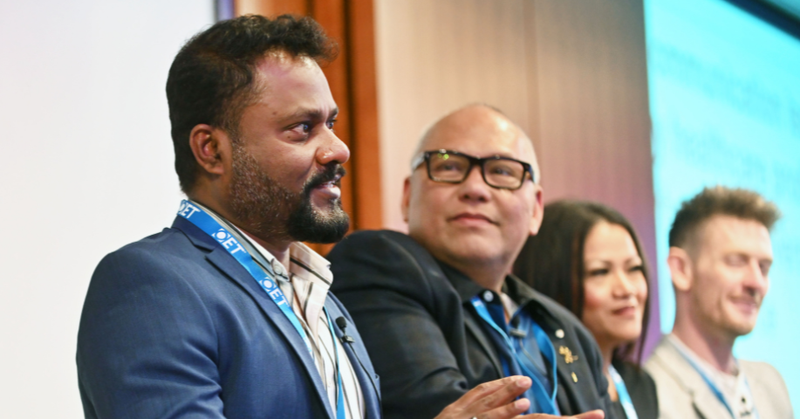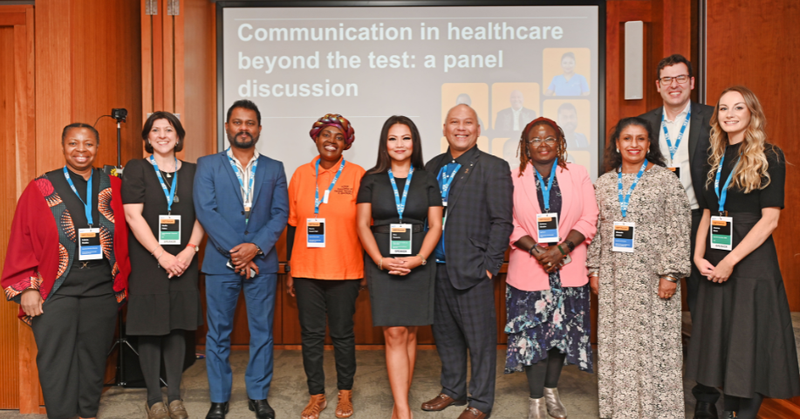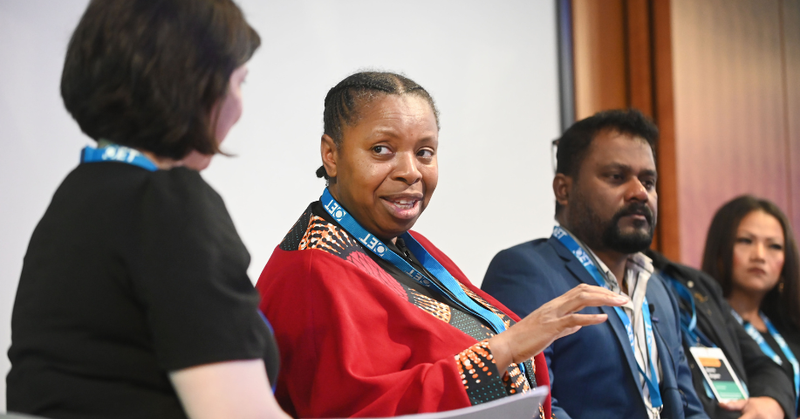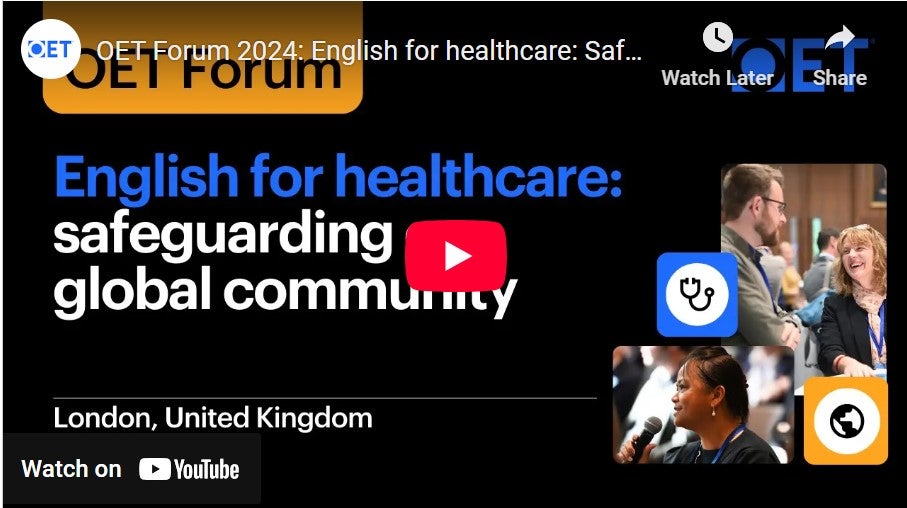
The vital role of diaspora groups
International nursing and midwifery associations (often called diaspora groups) are vital in helping international healthcare professionals settle into UK life and the NHS. They offer practical support, mentorship, and advocacy, ensuring their voices are heard and careers thrive. OET proudly supports these organisations, highlighting the challenges international professionals face.
Bridging communication gaps
In October 2024, OET hosted a panel at the OET Forum at the King’s Fund, London, uniting diaspora and NHS leaders, and language experts to address the challenges faced by internationally educated healthcare professionals in the UK.
Adjusting to life and work in the UK presents linguistic and cultural hurdles. International recruits must navigate new systems, dialects, and workplace interactions. Dennis Singson of the Philippine Nurses Association UK (PNAUK) noted that while healthcare workers encounter various accents in their home countries, adapting to them in a different cultural and linguistic environment is challenging.
Suresh Packiam, General Secretary of the British Indian Nurses Association (BINA), illustrated how language nuances create misunderstandings, citing how “tea” can mean a meal in some UK regions. Informal workplace interactions, jokes, and cultural references further complicate integration:
“In a staff area, people talk about EastEnders or some pop musician. Everyone laughs, but I’ll be the only one sitting there thinking, ‘I don’t understand what they’re saying.’ It’s a simple thing, but it matters.”
Felicia Kwaku OBE, Lead for Education and Training at Nigerian Nurses Charitable Association, UK (NNCAUK), highlighted how a lack of knowledge of idiomatic expressions affect patient care:
“If a patient says, ‘I want to spend a penny,’ trying to interpret that for five or ten minutes may result in a patient being incontinent, and that fractures the relationship with the patient.”
Felicia also highlighted how non-verbal cultural differences, such as norms around eye contact, can also lead to misunderstandings. For example, in the UK, avoiding direct eye contact is often perceived as dishonesty or nervousness, whereas in many cultures, it signifies respect.
These cultural differences, combined with language barriers, can undermine the confidence of overseas healthcare workers and hinder their career progression, a point echoed by May Parsons, Deputy Director of Quality and Patient Safety at Buckinghamshire Healthcare NHS Trust and Founder of the May Parsons Foundation:
“These barriers don’t just cause frustration. They actively hold us back from reaching our full potential… When communication breaks down, learning opportunities are often the first to be lost. Those who face communication barriers may miss out on essential learning experiences such as mentoring, feedback sessions, collaborative projects, and coaching.”
Speaking up: overcoming fear and building confidence
Diaspora groups help international recruits find their voice, yet many still struggle to speak up due to fear of repercussions or lack of confidence. Suresh Packiam noted:
“We often say to people, ‘You need to speak up.’ But they can’t. They worry, ‘Am I going to say things which may ruffle some feathers? I may not be able to communicate as effectively as possible, as accurate as possible.’”
The National Guardian’s Office, speaking at the Nursing Times Summit (November 2024), highlighted how fear of losing jobs or visa sponsorship discourages international staff from raising concerns. In addition to this, as May Parsons highlighted, we must keep in mind the role of cultural norms that international healthcare professionals will be accustomed to in their own countries which differs from the UK:
“Back in our countries, we deal with these things very hierarchically. Here, you’re expected to challenge inappropriate behaviour or even report unsafe practices. It’s a cultural shift that can feel overwhelming.”

Accelerating careers and thriving in the NHS
Many international nurses start as Band 5, even with extensive experience. Diaspora groups provide support to help them progress. Suresh Packiam emphasised:
“People already [held] senior positions in their own country, but how do we recognise them in this country? Career acceleration is so important. And the language is part of that. If we improve their language skills, they gain the confidence to integrate into the community.”
May Parsons reinforced that strong communication skills are essential for leadership:
“As nurses, our ability to communicate is not just a professional skill. It. Is essential for safeguarding our practice and ensuring safety and well-being of our patients. When it comes to leadership, securing a leadership role becomes significantly more challenging if we continue to experience communication barriers”
Felicia Kwaku underscored the need for systemic support:
“The system has to be two-way. It’s not just on the staff — it’s a shared responsibility to equip them with the communication skills and competencies to navigate these situations.”

The OET Test: A bridge to professional confidence
While communication challenges were the primary focus, it was recognised that the OET Test plays a pivotal role in preparing internationally educated professionals for real works NHS demands.
As a recent study by Cambridge University Press and Assessment found, many OET candidates only realised the relevance of the skills in the OET Test when they had completed their registration and were working in registered roles in the NHS.
However, as May Parsons said, maintaining that professional curiosity and mastery of the language is crucial for career progression, and we at OET know that language learning does not stop once you have registered in the UK – to become more familiar with colloquialisms and slang, individuals need to develop their advanced language skills at the Common European Framework of Reference (CEFR) levels C1-C2.
In collaboration with diaspora groups and CapitalNurse/NHS England, OET has launched Living the Language resources and communication workshops to support international healthcare professionals.
“They should be able to communicate as effective as possible. That’s why OET programme like that, to support them in improving language ability will be the way forward.” — Suresh Packiam
A call for greater collaboration
The panel urged stronger collaboration between diaspora groups, the NHS, and organisations like OET to create robust support systems for international recruits. Effective communication, as Felicia Kwaku noted, extends beyond language to include trust and inclusion:
“They (international recruits) need their rights. Need to be respected. The working conditions need to be good and safe and secure for them, and they need to understand the realities of working in the United Kingdom and in the West”
Diaspora groups are at the forefront of creating a more inclusive NHS through initiatives like mentoring, career coaching, and cultural adaptation programs. Dennis Singson reflected on the broader mission:
“Filipino nurses are known for providing excellent TLC — tender loving care — but we haven’t always been seen as leaders. It’s time to change that.”
Building a better future together
With thousands of internationally educated professionals contributing to the UK's diverse healthcare workforce, addressing communication barriers is critical. Through collaboration, diaspora groups, OET, and the NHS can create an environment where international recruits thrive and provide safe, effective care.
By hosting discussions like this, OET continues to shine a light on the critical intersection of language, culture, and healthcare. As we move forward, it is vital to recognise and celebrate the contributions of diaspora groups while fostering environments where all healthcare professionals can thrive.
“This is my first time attending an OET event, and I'm pleased to hear how your work aligns with the mission of Philippine Nurses Association UK” — Dennis Singson, Vice President, Philippine Nurses Association UK
Get involved
Are you part of a diaspora group supporting internationally educated healthcare professionals? Connect with OET to collaborate.
